- Home
- J. R. R. Tolkien
Sir Gawain and the Green Knight Page 3
Sir Gawain and the Green Knight Read online
Page 3
And this is the main purpose of the poem as distinct from its genesis or literary form: the doctrinal theme, in the form of an argument on salvation, by which the father is at last convinced that his Pearl, as a baptized infant and innocent, is undoubtedly saved, and, even more, admitted to the blessed company of the 144,000 that follow the Lamb. But the doctrinal theme is, in fact, inseparable from the literary form of the poem and its occasion; for it arises directly from the grief, which imparts deep feeling and urgency to the whole discussion. Without the elegiac basis and the sense of great personal loss which pervades it, Pearl would indeed be the mere theological treatise on a special point, which some critics have called it. But without the theological debate the grief would never have risen above the ground. Dramatically the debate represents a long process of thought and mental struggle, an experience as real as the first blind grief of bereavement. In his first mood, even if he had been granted a vision of the blessed in Heaven, the dreamer would have received it incredulously or rebelliously. And he would have awakened by the mound again, not in the gentle and serene resignation of the last stanza, but still as he is first seen, looking only backward, his mind filled with the horror of decay, wringing his hands, while his wreched wylle in wo ay wrazte.
IV
Sir Orfeo
Sir Orfeo is found in three manuscripts, of which the earliest gives very much the best text; this is the Auchinleck manuscript, a large miscellany made about 1330, probably in London, and now in the Advocates’ Library in Edinburgh. The other manuscripts, both of the fifteenth century, offer very decrepit versions of the poem; but the Auchinleck text has also suffered from the corruptions of error and forgetfulness, if much less so than the others. The translation follows the Auchinleck text (with some emendations), except at the beginning, where a leaf is lost from the manuscript. Auchinleck begins with Orfeo was a king (line 25 of the translation); but the manuscript Harley 3810 precedes this with the 24-line prologue which is here translated. This prologue appears also in a very corrupt state in the third manuscript, Ashmole 61; and, remarkably, also elsewhere in the Auchinleck manuscript, as the prologue of another poem, Lay le Freyne, which has been thought to be the work of the same author. In addition, lines 33-46 in the translation are introduced from the Harley manuscript; they are agreed to be genuine lines of the original. It is agreed that the references to England (line 26) and to Winchester (lines 49–50, and line 478), which are peculiar to the Auchinleck version, are not authentic.
It cannot be said where or when Sir Orfeo was composed with any more precision than probably in the south-east of England in the latter part of the thirteenth century, or early in the fourteenth; and it seems at any rate more probable than not that it was translated from a French original.
v
Editions
Sir Gawain and the Green Knight, edited by J. R. R. Tolkien and E. V. Gordon, Oxford 1925. This has been extensively revised in a second edition by Norman Davis, Oxford 1967.
Pearl, edited by E. V. Gordon, Oxford 1953.
Sir Orfeo, edited by A. J. Bliss, second edition Oxford 1966. This edition contains all three texts of the poem, and a discussion of the origins of this treatment of the legend of Orpheus and Eurydice.
The Auchinleck text, with the same insertions as are made in the translation, is given in Fourteenth Century Verse and Prose, edited by Kenneth Sisam, with a glossary by J. R. R. Tolkien (Oxford University Press).
VI
Note on the text of the translations
The details of presentation (most notably, the absence of line numbers in Sir Gawain and Pearl, and the use of inverted commas in interior quotations in Pearl) are in accordance with my father’s wishes.
Line 4 in stanza 42, and line 18 in stanza 98, of the translation of Sir Gawain are not in the original. They were introduced into the translation on the assumption that at these points lines had been lost from the original poem, and they are based on suggestions by Sir Israel Gollancz (edition of Sir Gawain and the Green Knight, Early English Text Society, 1940).
SIR GAWAIN AND THE GREEN KNIGHT
I
WHEN the siege and the assault had ceased at Troy, and the fortress fell in flame to firebrands and ashes, the traitor who the contrivance of treason there fashioned was tried for his treachery, the most true upon earth – it was Æneas the noble and his renowned kindred who then laid under them lands, and lords became of well-nigh all the wealth in the Western Isles. When royal Romulus to Rome his road had taken, in great pomp and pride he peopled it first, and named it with his own name that yet now it bears; Tirius went to Tuscany and towns founded, Langaberde in Lombardy uplifted halls, and far over the French flood Felix Brutus on many a broad bank and brae Britain
established full fair,
where strange things, strife and sadness,
at whiles in the land did fare,
and each other grief and gladness
oft fast have followed there.
2And when fair Britain was founded by this famous lord,
bold men were bred there who in battle rejoiced,
and many a time that betid they troubles aroused.
In this domain more marvels have by men been seen
than in any other that I know of since that olden time;
but of all that here abode in Britain as kings
ever was Arthur most honoured, as I have heard men tell.
Wherefore a marvel among men I mean to recall,
a sight strange to see some men have held it,
one of the wildest adventures of the wonders of Arthur.
If you will listen to this lay but a little while now,
I will tell it at once as in town I have heard
it told,
as it is fixed and fettered
in story brave and bold,
thus linked and truly lettered,
as was loved in this land of old.
3This king lay at Camelot at Christmas-tide
with many a lovely lord, lieges most noble,
indeed of the Table Round all those tried brethren,
amid merriment unmatched and mirth without care.
There tourneyed many a time the trusty knights,
and jousted full joyously these gentle lords;
then to the court they came at carols to play.
For there the feast was unfailing full fifteen days,
with all meats and all mirth that men could devise,
such gladness and gaiety as was glorious to hear,
din of voices by day, and dancing by night;
all happiness at the highest in halls and in bowers
had the lords and the ladies, such as they loved most dearly.
With all the bliss of this world they abode together,
the knights most renowned after the name of Christ,
and the ladies most lovely that ever life enjoyed,
and he, king most courteous, who that court possessed.
For all that folk so fair did in their first estate abide,
Under heaven the first in fame,
their king most high in pride;
it would now be hard to name
a troop in war so tried.
4While New Year was yet young that yestereve had arrived,
that day double dainties on the dais were served,
when the king was there come with his courtiers to the hall,
and the chanting of the choir in the chapel had ended.
With loud clamour and cries both clerks and laymen
Noel announced anew, and named it full often;
then nobles ran anon with New Year gifts,
Handsels, handsels they shouted, and handed them out,
Competed for those presents in playful debate;
ladies laughed loudly, though they lost the game,
and he that won was not woeful, as may well be believed.
All this merriment they made, till their meat was served;
then they washed, and mannerly went to their seats,
ever the highest for the worthiest, as was held to be best.
Queen Guinevere the gay was with grace in the midst
of the adorned dais set. Dearly was it arrayed:
finest sendal at her sides, a ceiling above her
of true tissue of Tolouse, and tapestries of Tharsia
that were embroidered and bound with the brightest gems
one might prove and appraise to purchase for coin any day.
That loveliest lady there
on them glanced with eyes of grey;
that he found ever one more fair
in sooth might no man say.
5But Arthur would not eat until all were served;
his youth made him so merry with the moods of a boy,
he liked lighthearted life, so loved he the less
either long to be lying or long to be seated
so worked on him his young blood and wayward brain.
And another rule moreover was his reason besides
that in pride he had appointed: it pleased him not to eat
upon festival so fair, ere he first were apprised
of some strange story or stirring adventure,
or some moving marvel that he might believe in
of noble men, knighthood, or new adventures;
or a challenger should come a champion seeking
to join with him in jousting, in jeopardy to set
his life against life, each allowing the other
the favour of fortune, were she fairer to him.
This was the king’s custom, wherever his court was holden,
at each famous feast among his fair company
in hall
So his face doth proud appear,
and he sta
nds up stout and tall,
all young in the New Year;
much mirth he makes with all.
6Thus there stands up straight the stern king himself,
talking before the high table of trifles courtly.
There good Gawain was set at Guinevere’s side,
with Agravain a la Dure Main on the other side seated,
both their lord’s sister-sons, loyal-hearted knights.
Bishop Baldwin had the honour of the board’s service,
and Iwain Urien’s son ate beside him.
These dined on the dais and daintily fared,
and many a loyal lord below at the long tables.
Then forth came the first course with fanfare of trumpets,
on which many bright banners bravely were hanging;
noise of drums then anew and the noble pipes,
warbling wild and keen, wakened their music,
so that many hearts rose high hearing their playing.
Then forth was brought a feast, fare of the noblest,
multitude of fresh meats on so many dishes
that free places were few in front of the people
to set the silver things full of soups on cloth
so white.
Each lord of his liking there
without lack took with delight:
twelve plates to every pair,
good beer and wine all bright.
7Now of their service I will say nothing more,
for you are all well aware that no want would there be.
Another noise that was new drew near on a sudden,
so that their lord might have leave at last to take food.
For hardly had the music but a moment ended,
and the first course in the court as was custom been served,
when there passed through the portals a perilous horseman,
the mightiest on middle-earth in measure of height,
from his gorge to his girdle so great and so square,
and his loins and his limbs so long and so huge,
that half a troll upon earth I trow that he was,
but the largest man alive at least I declare him;
and yet the seemliest for his size that could sit on a horse,
for though in back and in breast his body was grim,
both his paunch and his waist were properly slight,
and all his features followed his fashion so gay in mode;
for at the hue men gaped aghast
in his face and form that showed;
as a fay-man fell he passed,
and green all over glowed.
8All of green were they made, both garments and man:
a coat tight and close that clung to his sides;
a rich robe above it all arrayed within
with fur finely trimmed, shewing fair fringes
of handsome ermine gay, as his hood was also,
that was lifted from his locks and laid on his shoulders;
and trim hose tight-drawn of tincture alike
that clung to his calves; and clear spurs below
of bright gold on silk broideries banded most richly,
though unshod were his shanks, for shoeless he rode.
And verily all this vesture was of verdure clear,
both the bars on his belt, and bright stones besides
that were richly arranged in his array so fair,
set on himself and on his saddle upon silk fabrics:
it would be too hard to rehearse one half of the trifles
that were embroidered upon them, what with birds and with flies
in a gay glory of green, and ever gold in the midst.
The pendants of his poitrel, his proud crupper,
his molains, and all the metal to say more, were enamelled,
even the stirrups that he stood in were stained of the same;
and his saddlebows in suit, and their sumptuous skirts,
which ever glimmered and glinted all with green jewels;
even the horse that upheld him in hue was the same,
I tell:
a green horse great and thick,
a stallion stiff to quell,
in broidered bridle quick:
he matched his master well.
9Very gay was this great man guised all in green,
and the hair of his head with his horse’s accorded:
fair flapping locks enfolding his shoulders,
a big beard like a bush over his breast hanging
that with the handsome hair from his head falling
was sharp shorn to an edge just short of his elbows,
so that half his arms under it were hid, as it were
in a king’s capadoce that encloses his neck.
The mane of that mighty horse was of much the same sort,
well curled and all combed, with many curious knots
woven in with gold wire about the wondrous green,
ever a strand of the hair and a string of the gold;
the tail and the top-lock were twined all to match
and both bound with a band of a brilliant green:
with dear jewels bedight to the dock’s ending,
and twisted then on top was a tight-knitted knot
on which many burnished bells of bright gold jingled.
Such a mount on middle-earth, or man to ride him,
was never beheld in that hall with eyes ere that time; for there
his glance was as lightning bright,
so did all that saw him swear;
no man would have the might,
they thought, his blows to bear.
10And yet he had not a helm, nor a hauberk either,
not a pisane, not a plate that was proper to arms;
not a shield, not a shaft, for shock or for blow,
but in his one hand he held a holly-bundle,
that is greatest in greenery when groves are leafless,
and an axe in the other, ugly and monstrous,
a ruthless weapon aright for one in rhyme to describe:
the head was as large and as long as an ellwand,
a branch of green steel and of beaten gold;
the bit, burnished bright and broad at the edge,
as well shaped for shearing as sharp razors;
the stem was a stout staff, by which sternly he gripped it,
all bound with iron about to the base of the handle,
and engraven in green in graceful patterns,
lapped round with a lanyard that was lashed to the head
and down the length of the haft was looped many times;
and tassels of price were tied there in plenty
to bosses of the bright green, braided most richly.
Such was he that now hastened in, the hall entering,
pressing forward to the dais – no peril he feared.
To none gave he greeting, gazing above them,
and the first word that he winged: ‘Now where is’, he said,
‘the governor of this gathering? For gladly I would
on the same set my sight, and with himself now talk
in town.’
On the courtiers he cast his eye,
and rolled it up and down;
he stopped, and stared to espy
who there had most renown.
11Then they looked for a long while, on that lord gazing;
for every man marvelled what it could mean indeed
that horseman and horse such a hue should come by
as to grow green as the grass, and greener it seemed,
than green enamel on gold glowing far brighter.
All stared that stood there and stole up nearer,
watching him and wondering what in the world he would do.
For many marvels they had seen, but to match this nothing;
wherefore a phantom and fay-magic folk there thought it,
and so to answer little eager was any of those knights,
and astounded at his stern voice stone-still they sat there
in a swooning silence through that solemn chamber,
as if all had dropped into a dream, so died their voices
away.
Not only, I deem, for dread;
but of some ’twas their courtly way
to allow their lord and head
to the guest his word to say.

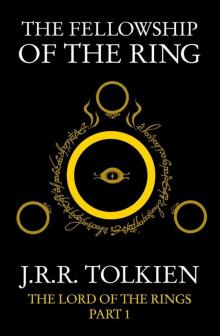 The Fellowship of the Ring
The Fellowship of the Ring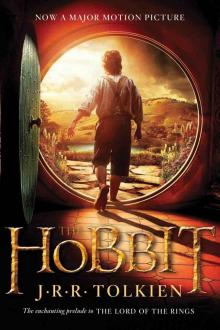 The Hobbit
The Hobbit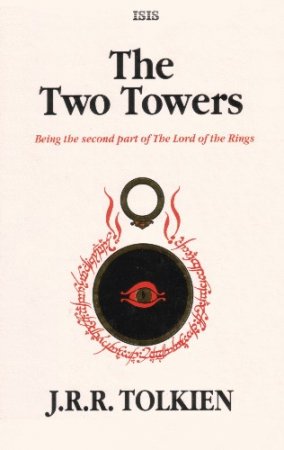 The Two Towers
The Two Towers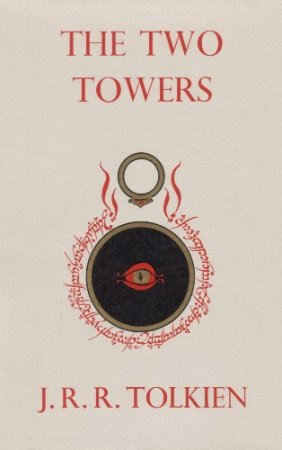 The Return of the King
The Return of the King Tales From the Perilous Realm
Tales From the Perilous Realm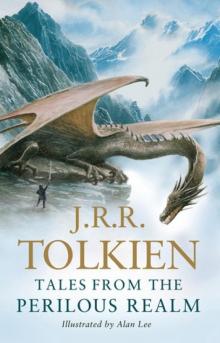 Leaf by Niggle
Leaf by Niggle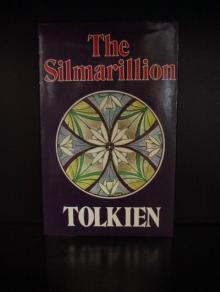 The Silmarillon
The Silmarillon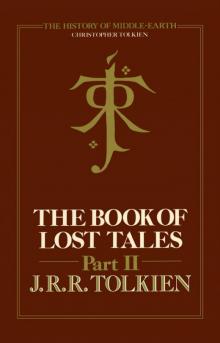 The Book of Lost Tales, Part Two
The Book of Lost Tales, Part Two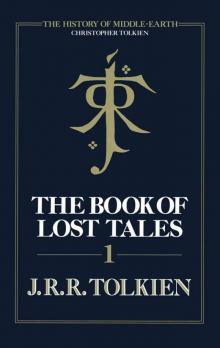 The Book of Lost Tales, Part One
The Book of Lost Tales, Part One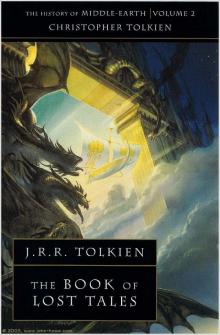 The Book of Lost Tales 2
The Book of Lost Tales 2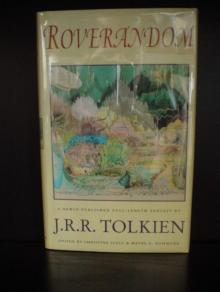 Roverandom
Roverandom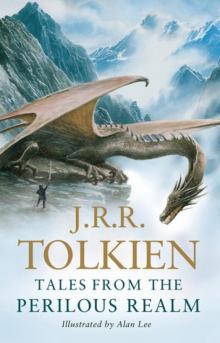 Smith of Wootton Major
Smith of Wootton Major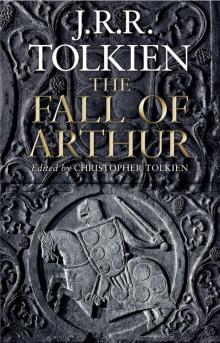 The Fall of Arthur
The Fall of Arthur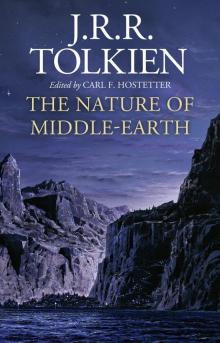 The Nature of Middle-earth
The Nature of Middle-earth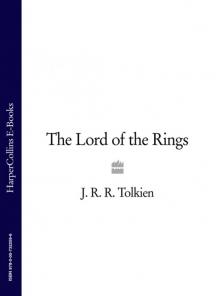 The Lord of the Rings: The Fellowship of the Ring, The Two Towers, The Return of the King
The Lord of the Rings: The Fellowship of the Ring, The Two Towers, The Return of the King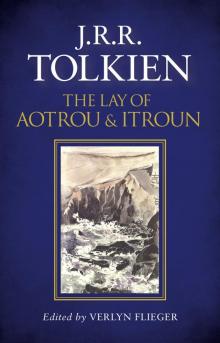 The Lay of Aotrou and Itroun
The Lay of Aotrou and Itroun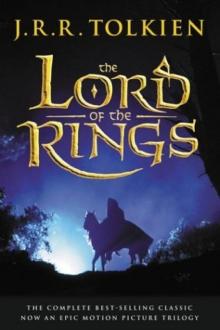 lord_rings.qxd
lord_rings.qxd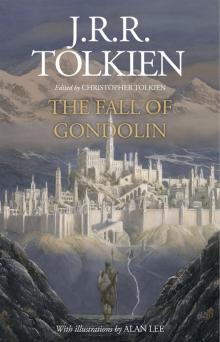 The Fall of Gondolin
The Fall of Gondolin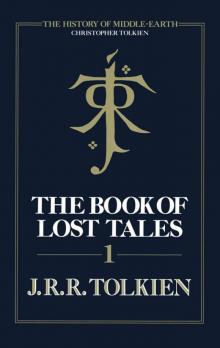 The Book of Lost Tales, Part 1
The Book of Lost Tales, Part 1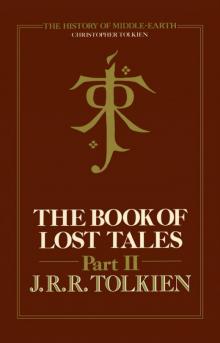 The Book of Lost Tales, Part 2
The Book of Lost Tales, Part 2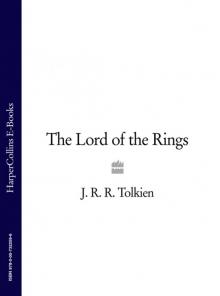 The Lord of the Rings
The Lord of the Rings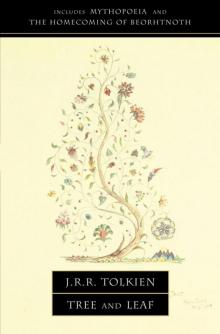 Tree and Leaf
Tree and Leaf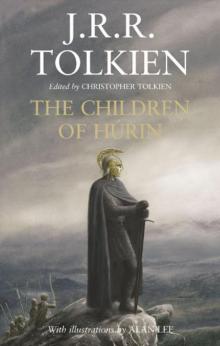 The Children of Húrin
The Children of Húrin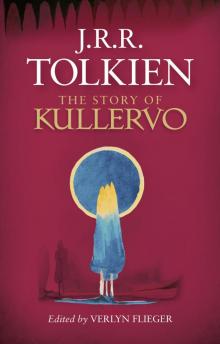 The Story of Kullervo
The Story of Kullervo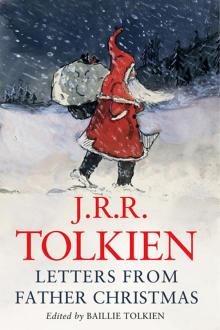 Letters From Father Christmas
Letters From Father Christmas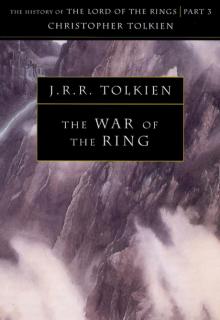 The History of Middle Earth: Volume 8 - The War of the Ring
The History of Middle Earth: Volume 8 - The War of the Ring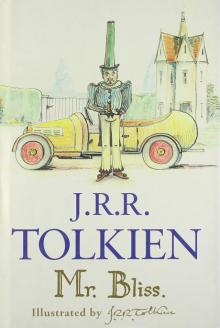 Mr. Bliss
Mr. Bliss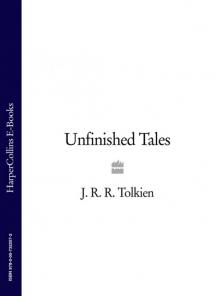 Unfinished Tales
Unfinished Tales The Adventures of Tom Bombadil
The Adventures of Tom Bombadil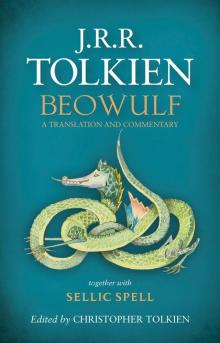 Beowulf: A Translation and Commentary, together with Sellic Spell
Beowulf: A Translation and Commentary, together with Sellic Spell The Silmarillion
The Silmarillion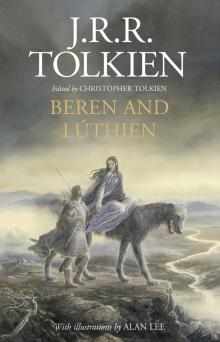 Beren and Lúthien
Beren and Lúthien